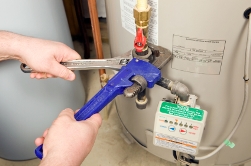What to Ask Plumbing Technical Schools

Once you have decided to earn a diploma, certificate or degree, you can start to refine your school options. Since there are numerous plumbing vocational and trade schools in the Philadelphia PA area, it's essential to have a checklist of criteria that each school must meet. The first two that we discussed were location and tuition expense. And even though both qualifiers may be important when making your decision, there are other variables that must be taken into account also. Following is a checklist of those additional qualifications that you will need to assess prior to choosing a plumber trade school.
Is the Plumbing School Accredited? A large number of plumbing trade schools have attained either a regional or a national accreditation. They may acquire Institutional Accreditation, which involves the school's programs overall, or Programmatic Accreditation, which relates to an individual program, such as electrical technology. Make sure that the Philadelphia PA school and program are accredited by a U.S. Department of Education recognized accrediting agency, which includes the Accreditation Board for Engineering and Technology. Along with helping make certain that you receive a superior education, it may help in acquiring financial assistance or student loans, which are in many cases unavailable for non-accredited programs. Furthermore, many states require that the plumbing training course be accredited in order to be approved for licensing or certification.
Is the Plumbing School Licensed? Along with accreditation, an additional way of confirming that a trade school you’re reiewing is reputable is by making sure that it’s properly licensed. Licensing is usually controlled and regulated by state agencies, such as the Pennsylvania Department of Education. If you don’t know, ask the school which state agency regulates its licensing and then verify that it’s up to date.
How Long has the School been in Business? Another means of determining the quality of a technical school is to find out how long it’s been in business. The longer a school has been in operation, the more likely that its programs are highly rated and regarded. Conversely, schools that are not well regarded or that provide low quality training generally don’t stand the test of time. However, keep in mind that even the best of Philadelphia PA schools had to start from their first day of operation, so only use it as one of several qualifications for each school you are considering.
What are the School’s Completion and Placement Rates? Ask the plumbing schools you are looking at what their completion rates are. The completion rate is the portion or percentage of students who enroll in and complete the course. A low completion rate may suggest that students were unhappy with the course and quit. It could also indicate that the instructors were not competent to train the students. It's similarly imperative that the schools have high job placement rates. Older and/or more reputable schools may have a more extensive list of graduates, which can result in more contacts for the school to employ for their apprenticeship and job placement programs. A high job placement rate can not only affirm that the school has a good reputation within the industry, but additionally that it has the network of contacts to help graduates secure apprenticeships or jobs in the Philadelphia PA area.
Are Apprenticeship Programs Sponsored? Numerous plumber training programs are taught along with an internship or an apprenticeship program. Those participating vocational and technical schools will help place you in an apprenticeship program within their network of plumbing businesses or labor unions. Check if the schools you are considering have referring relationships with local Philadelphia PA plumbers or plumbing contractors. An apprenticeship not only offers a rewarding experience by supplying hands-on training, but it also supplies employment opportunities and helps to form relationships in the local plumbing professional community.
Are there Modern Facilities? Confirm that the campus facilities and the tools that you will be trained on are up-to-date and what you will be working with on the job. If you are presently in an internship or an apprenticeship, consult with the master plumber you are working under regarding what you should be looking for. Otherwise, ask a local Philadelphia PA plumbing contractor if they can give you some tips.
Where is the School Located? Unless you can relocate, the school needs to be within driving distance of your Philadelphia PA residence. Remember that if you decide to enroll in an out-of-state school, besides the added relocation costs there can be higher tuition charges compared to in-state residents.
Are there Smaller Classes? It's important that you receive as much one-on-one training as possible, which can be difficult in larger classes. Ask if you can monitor some of the classes so that you can see how large they are and witness first hand the interaction between teachers and students. Speak to a few of the students and get their comments regarding class sizes and instruction. Finally, speak to some of the teachers and find out what their level of experience is in Philadelphia PA and what certifications or degrees they hold.
Is the Class Schedule Convenient? Verify that the class schedules for the schools you are reviewing are flexible enough to meet your needs. If you are only able to go to classes at night or on weekends near Philadelphia PA, verify that the programs you are reviewing provide those choices. If you can only attend on a part-time basis, make sure that the school you select permits part-time enrollment. Finally, check out what the policy is to make-up classes should you miss any because of work, sickness or family responsibilities.
